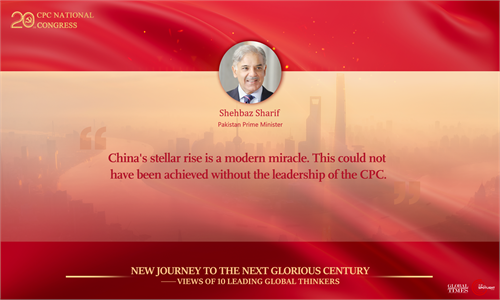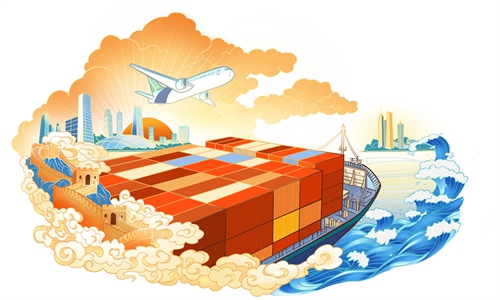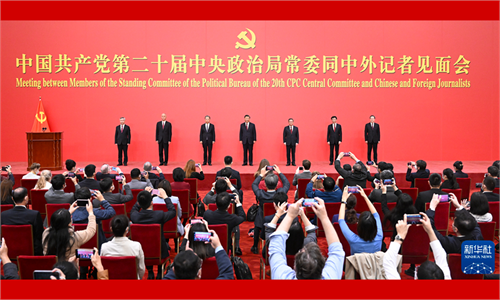
Photo: VCG
Editor's Note:China had an epic decade since 2012. Particularly in the last five years, which are truly momentous, extraordinary, the country has successfully dealt with major challenges including turbulent developments in Hong Kong Special Administrative Region and the COVID-19 epidemic. The 20th National Congress of the Communist Party of China (CPC) has laid out plans for the strategic missions and major measures in the next five years, getting the efforts to build a modern socialist country in all respects off to a good start.
In an interview with Global Times (GT) reporter Wang Wenwen, Alistair Michie (Michie), Secretary General of the British East Asia Council and leading expert in public diplomacy and China issues, shared his views of what changes of China over the past 10 years impressed him the most and what are the lessons and inspirations of Chinese modernization for other developing countries.
GT: What has impressed you the most regarding China's changes over the past 10 years?
Michie: From a perspective outside of the pattern of China's changes in the past 10 years, I would say how Chinese global governance stands out for its consistency and scale. For example, its support for the United Nations. China plays a huge role as one of the five members of the UN Security Council (P5). The highly influential top US think tank, Brookings, supports this, for example, in UN peacekeeping. Brookings stated: "China's status as P5 power, major funder, and (at least by P5 standards) significant personnel contributor to the U.N. is unique." Other nations have blocked China's ability to expand its role in other key global agencies such as the IMF and the World Bank. As a result, China has made a significant positive contribution to global economic governance with its lead to create the AIIB - the Asian International Investment Bank.
On COVID-19, Chinese scientists played a significant role as reported by the very well-respected Science journal: "Chinese scientists can boast that they made major contributions to the science of SARS-CoV-2, as the virus was christened in February 2020, and taught the world vital lessons about how the outbreak might be contained."
But I believe that it is in tackling climate change where China has an outstanding track record in international global governance. The blueprint for its policies was set out very clearly in the reports to the 18th-, 19th- and 20th Party Congress. It is highly significant that previous congress reports had no sections on environmental issues. So, President Xi Jinping deserves great credit for the lead he has given in evolving the commitment of China to tackle climate change through these policies. The consistency and scale are reflected in how these policies have given China a global lead in wind and solar power as well as electric vehicles.
My frustration is that many outside of China do not know about these contributions China is making to global governance and advances that benefit all mankind. That "crisis in communication," as I call it, stems from the need for China to have a massive mind-set change in how China tells its stories to the world. At root is a failure to grasp that how you communicate inside China does not work outside of China.
GT: For over two decades, you have been committed to building global understanding of China. There is a lack of understanding of China, especially in Western countries. Why do you think they lack the will to understand China?
Michie: There is a "communication crisis" in the world about understanding China. Outside China the will to understand China is being manipulated against true understanding by the "military industrial complex" within the US. This complex is driven by a motivation to perpetuate the hegemony of the US. Without that hegemony the "complex" lacks the motivation to try and retain US military domination worldwide.
The rise in aggression of the US towards China has been manipulated by this military industrial complex. A core reason is a growing fear within this complex that China could be gaining advantage of the armaments business of the future - the use of digital technologies. This is a direct reason why the US is doing its best to starve China from access to the most advanced semi-conductors in the world. The reason is that these advanced computer chips are likely to be the key to dominant weapons of the next decades.
The US military-industrial complex has been super clever at persuading US Government agencies to capture the foreign policy of many G20 nations and turn them to be aggressive to China. The complex has huge power to influence US government as it provides billions of US dollars needed to win elections in the US for politicians.
A major frustration is that no major media outside of China has woken up to this threat and expose the threat to all humanity. It will take brave media leaders to challenge the complex as the complex has vast power and resources to cut off advertising payments that the media needs to exist.

Alistair Michie Photo: Courtesy of Michie
GT: You advise Chinese officials on public diplomacy. In your eyes, how does China's public diplomacy work out in the past five years?Michie: The text of the 20th Party Congress political report provides an excellent insight into the consistency of Chinese public diplomacy since the 18th Congress in 2012. This consistency and its driving spirit is of huge importance and is embodied in this text from the 20th Congress report: "Building a human community with a shared future is the way forward for all the world's peoples… It is in this spirit that China has put forward the Global Development Initiative and the Global Security Initiative, and it stands ready to work with the international community to put these two initiatives into action."
It is deeply frustrating for China that the major leaders of the world are not responding proactively to the above policy proposals. The answer for China is not aggressive "wolf warrior" style diplomacy but utilizing much smarter strategies embedded in the millennia of Chinese history and culture. For example, the wise words of Sun Tzu where he proposed that the clever way is to avoid conflict and use intelligence and knowledge to turn enemies into friends.
GT: The US midterm election has ended, with political struggles between the two parties intensifying. Britain's political scene is also in chaos. In Western countries like the US and the UK, political parties are constantly fighting internally, leading the approval ratings of many ruling parties to be at a record low. Can electoral politics solve social problems?
Michie: I strongly support the feelings expressed by President Xi in many speeches during the past 10 years. For example, in Paris on March 27, 2014 at UNESCO:
"We need to encourage different civilizations to respect each other and live together in harmony while promoting their exchanges and mutual learning as a bridge of friendship among peoples, a driving force behind human society and a strong bond for world peace."
Mutual learning generates understanding and respect that every nation thrives by having a governance system that is in harmony with the needs of the people of that country. China, since 1949, has experienced huge changes in the stability of its governance. The stability and success of Chinese governance since 1978 and the start of "reform and opening-up" must be viewed in the context of the challenges between 1966 and 1967 inside China.
That pattern means it is crucial Chinese people use deep mutual understanding, respect and learning about the political upheavals that are impacting in the US and the UK. Any reader of the political histories of the US and UK reveal that the current challenges are nothing new. The UK and US will work through their current challenges and return to a period of success and stability. It is vital that China shows understanding as many issues posing catastrophic threats to all humanity can only be resolved through international consensus - for example, climate change.
GT: The just concluded 20th National Congress of the CPC has made important policy arrangements for the next five years, showing the consistency and continuity of policies in the governance of the CPC. What advantages do you perceive for the CPC that transcends the election cycle? As a major power, what does China's stability and certainty mean for the world?
Michie: China's stability, certainty and consistency are utterly crucial for all humanity at this period in human history. What is vital is that China recognizes that it is in the core interest of the Chinese people to find a way to resolving the global "communication crisis." The mass of people in the world outside of China are denied by their media the facts about the reality of China. This denial will not resolve through efforts by people in the US and Europe which dominate the global media agenda in English. The solution has to come from inside China through a massive mind-set change how it communicates outside of China. I am a realist and know that the Communist Party of China will require it directs the process. The Party can do this in exactly the way it guided the massive mind-set change that drove the reform and opening-up policies of economic reform that utterly changed China and the world. What the Party must now grasp is leading with "reform and opening-up policies" that utterly changes how China communicates outside of China through directing a new "mind-set."
GT: The CPC put forward the concept of Chinese modernization. There are obvious differences between Chinese modernization and Western modernization. What do you think of Chinese modernization? What are the lessons and inspirations of Chinese modernization for other developing countries?
Michie: China has modernized led by a core characteristic of the CPC. This has been the ability since 1949 for the CPC to have a mind-set that creates constant adaptation and innovation. That is best seen in the massive mind-set changes that were required of the Chinese people when the CPC adopted the ideas and the influence of Deng Xiaoping to create the "reform and opening-up" policies introduced in 1978. That process required a phenomenal amount of innovation and adaptation.
I think it would be a big mistake to compare the experience of China with the modernization of other cultures and countries. Every nation must develop and advance in its own way and its own speed. That requires a great deal of mutual respect and understanding between nations. It is hugely important that China strongly supports an approach rooted in mutual respect and learning.
However, if other nations choose to study China with an open mind, then they would learn much to value and adopt. The reason is that the history of China embraces the longest continuous civilization in the world. The patterns of history of China provide many valuable lessons about good governance.
GT: In the West, voices that call for decoupling from China are getting louder these days. China is an important trading partner to many Western countries, including the UK. Can they truly decouple from China?
Michie: Part of the global communication crisis is that outside of China in media there has been an explosion of the amount of "opinion." This means that reporting of facts gets buried in this morass of opinion. The decoupling calls are coming from opinion writers who show scant regard for the facts.
The facts are that humanity now lives in a globalized world and that it is impossible to decouple between the really major economies. Yes - in this past year there have been attempts to decouple Russia from Europe and US. But Russia is in reality a very small global economy - comparable in size to Spain. So, with small nations some decoupling is possible - but even in the case of Russia this has proved very challenging. For example, the vast economy of India is still trading with Russia.
Of much greater significance than decoupling is the rapid advance of economic sovereignty in core components and resources. This trend is coming into sharp focus in the sector of advanced semi-conductors. In this sector the supply sources have become very concentrated in a few areas such as South Korea, Taiwan, Holland and the US. The concentration has arisen due to the vast amounts of money and very skilled talent needed to create these most advanced semi-conductors. As China is finding there is no short-term solution to unlocking the concentration. No amount of funding can immediately replicate the supply of the human skill needed to create these advanced semi-conductors. The resolution to the supply and demand issues of advanced semi-conductors will have far more global impact than any prospect of decoupling of economies.



